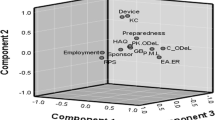Abstract
The research goal is to investigate pedagogical students’ preferences of ICT in alternative (distance) education. The primary research issue concerns selecting the most helpful ICT for temporary distance education of pedagogical students. It splits into more specific issues concerning (1) the ranking of ICT in temporary distance education in different groups of students, (2) gadgets mostly applied in distance education, (3) technologies preferred by students and teachers for learning new information, (4) and technologies for testing knowledge and skills. We apply the case study method and method of ranking in the research. Internet survey serves as a data collection technique. The results show that full-time and part-time students select the same three essential technologies for alternative education, but their selection of ICT differs from teachers’ preferences. Besides, we have registered some gender differences in ICT selection. The results deviate from other scholars’ research as students’ preferences of ICT in this paper depend on the distance of education. The research results may be of interest to educators engaged in teacher training.
Access this chapter
Tax calculation will be finalised at checkout
Purchases are for personal use only
Similar content being viewed by others
References
Andryukhina LM, Sadovnikova NO, Utkina SN, Mirza-ahmedov AM (2020) Digitalization of professional education: prospects and invisible barriers. Educ Sci J 3(22): 116-147. https://doi.org/10.17853/1994-5639-2020-3-116-147
Avetisyan PS, Gevorkyan NM (2018) Human capital development in a digital economy: challenges the education system is facing. Bull Russ-Armen Univ 2:122–128
Batenova Ju V, Dolgova VI, Emelyanova IE, Ivanova I Yu, Pikuleva LK, Filippova OG (2019) Readiness for informational interaction of subjects of the educational process. Perspekt Nauk I Obraz 41(5): 34-46. https://doi.org/10.32744/pse.2019.5.3
Cohen L, Manion L, Morrison K (2007) Research methods in education, 6th edn. Routledge Tailor and Francis Group, London and New York, UK and NY
Government of the Russian Federation (2016) Priority project in the field of education “Modern digital educational environment in the Russian Federation” (October 25, 2016 No. 9). Moscow, Russia
Kabanova EE, Vetrova EA (2019) The use of modern electronic gadgets in the educational process of the university. Eur J Contemp Educ 8(3):524-533. https://doi.org/10.13187/ejced.2019.3.524
Klimenskikh MV, Lebedeva Ju V, Maltsev AV, Savelyev VV (2019) Psychological factors of online-learning efficiency of students. Perspekt Nauk I Obraz 42(6):312-321. https://doi.org/10.32744/pse.2019.6.26
Kruchinina GA, Svetkina EG (2016) The use of innovative forms of training in the development of health-saving competencies of University students. Vestnik of Lobachevsky State University of Nizhni Novgorod. Series: Social Sciences, 3(43): 155-162
Matuszak AF, Uvarina NV (2019) ICT in teaching undergraduate students. Balt MaritE Forum 1:528–533
Pletyago TY, Ostapenko AS, Antonova SN (2019) Pedagogical models of blended learning: on the experience of Russian and foreign practice of design and implementation. Educ Sci J 5(21): 113-130. https://doi.org/10.17853/1994-5639-2019-5-113-130
Tchoshanov M (2013) Engineering of learning: Conceptualizing e-Didactics. UNESCO Institute for Information Technologies in Education, Moscow, Russia
Tyukavkin NM (2019) Digitalization of educational process in universities. Expert: Theory Pract 1(1): 35-41
Valeeva NG, Pavlova EB, Zakirova Yu L (2019) M-learning in teaching ESP: case study of ecology students. Eur J Contemp Educ 8(4): 920-930. https://doi.org/10.13187/ejced.2019.4.920
Acknowledgments
This article was financially supported by the Mordovian State Pedagogical Institute Named After M. E. Evsevyev under the contract to implement research work dated 01.06.2020, No. 16-305 on the topic “Organization of Alternative Education in a Socio-Cultural Context.”
Author information
Authors and Affiliations
Corresponding author
Editor information
Editors and Affiliations
Rights and permissions
Copyright information
© 2023 The Author(s), under exclusive license to Springer Nature Switzerland AG
About this chapter
Cite this chapter
Matuszak, A.F., Pavlova, O.Y., Kalugina, E.V., Mukhametshina, O.V., Kusarbaev, R.I. (2023). Selecting ICT in Alternative Training. In: Maximova, S.G., Raikin, R.I., Chibilev, A.A., Silantyeva, M.M. (eds) Advances in Natural, Human-Made, and Coupled Human-Natural Systems Research. Lecture Notes in Networks and Systems, vol 234. Springer, Cham. https://doi.org/10.1007/978-3-030-75483-9_64
Download citation
DOI: https://doi.org/10.1007/978-3-030-75483-9_64
Published:
Publisher Name: Springer, Cham
Print ISBN: 978-3-030-75482-2
Online ISBN: 978-3-030-75483-9
eBook Packages: Intelligent Technologies and RoboticsIntelligent Technologies and Robotics (R0)




